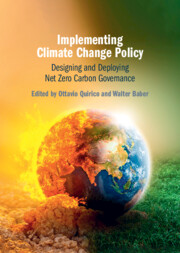Book contents
- Implementing Climate Change Policy
- Implementing Climate Change Policy
- Copyright page
- Additional material
- Dedication
- Contents
- Contributors
- Abbreviations
- Introduction
- Part I Comparing Climate Policies
- 1 The Earth’s Climate and Ongoing Global Change
- 2 Building Blocks of the European Union’s Strategy for Climate Neutrality
- 3 Environmental Constitutionalism
- 4 Avoiding Russia’s Sphere of Influence: The European Union, Energy Supply and Climate Sustainability
- 5 The USA and Climate Policies
- 6 Great Expectations
- 7 What Does ‘Green’ Mean for a Green Belt and Road?
- 8 Embracing Complexity: Water and Climate Policy in the Middle East and North Africa
- 9 Between Europe and the People’s Republic of China: Understanding Africa’s Energy Transition
- Part II Designing Effective Governance Mechanisms
- Conclusion
- Documents
- Cases
- Bibliography
- Index
4 - Avoiding Russia’s Sphere of Influence: The European Union, Energy Supply and Climate Sustainability
from Part I - Comparing Climate Policies
Published online by Cambridge University Press: 22 November 2024
- Implementing Climate Change Policy
- Implementing Climate Change Policy
- Copyright page
- Additional material
- Dedication
- Contents
- Contributors
- Abbreviations
- Introduction
- Part I Comparing Climate Policies
- 1 The Earth’s Climate and Ongoing Global Change
- 2 Building Blocks of the European Union’s Strategy for Climate Neutrality
- 3 Environmental Constitutionalism
- 4 Avoiding Russia’s Sphere of Influence: The European Union, Energy Supply and Climate Sustainability
- 5 The USA and Climate Policies
- 6 Great Expectations
- 7 What Does ‘Green’ Mean for a Green Belt and Road?
- 8 Embracing Complexity: Water and Climate Policy in the Middle East and North Africa
- 9 Between Europe and the People’s Republic of China: Understanding Africa’s Energy Transition
- Part II Designing Effective Governance Mechanisms
- Conclusion
- Documents
- Cases
- Bibliography
- Index
Summary
Russia is one of the main oil and gas producers and one of the biggest emitters of carbon dioxide globally. Its energy policies are still underpinned by the necessity of establishing ‘spheres of influence’ and are not on track to achieve the objectives of the United Nations Framework Convention on Climate Change (UNFCCC) and the Paris Agreement. Politically, war in Ukraine is arguably a consequence of this approach and discloses for the European Union (EU) the possibility of a diversification of its energy sources to achieve security of supply, which unlocks the opportunity of accelerating the green transition envisaged in the European Green Deal. Legally, given that they are not at war with Russia, the EU and its Member States could invoke the energy supply crisis and the political misalignment between the Russian energy policy and the Green Deal, rather than war per se, as a justification to abandon consolidated long-term energy contracts and accelerate the green transition.
- Type
- Chapter
- Information
- Implementing Climate Change PolicyDesigning and Deploying Net Zero Carbon Governance, pp. 67 - 79Publisher: Cambridge University PressPrint publication year: 2024

